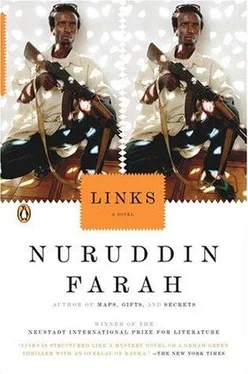He was wearing a sarong that he had brought from New York — a present from his wife — a Yankees T-shirt, and under the sarong, a pair of swimming trunks. Around his shoulders was a towel. For shoes he had a cheap pair of Chinese-made flip-flops, the only item he had purchased in Mogadiscio since his arrival, from a vendor at the hotel. When he had inquired at the reception desk about going to the ocean for a swim, the man at the reception desk seemed amused, maybe because of Jeebleh’s attire. The man told him that the beach was no more than a five minutes’ walk away. He was to go east, and he would soon come to it.
The water stretched endlessly before him. He stared at its immensity, and had a moment of recollection. He was in his early teens, with Bile, and the two were escaping from Caloosha. In his memory, the ocean was a place of refuge, because Caloosha had never learned to swim, despite his having been in Mogadiscio for much of his life. When the memory faded, Jeebleh looked this way and that, and noted that the beach was deserted. He took off his sarong, T-shirt, and towel, and placed them under a stone, to make sure he would find them later.
After he had been in the shallow water only a few minutes, it occurred to him that it might not be worth risking his life for a dip in the ocean. Not that he was afraid of the surf or of sharks. He saw three men on the beach looking in his direction. He suspected that one of them was armed; he seemed to have a shiny revolverlike weapon in his grip. He guessed the man could easily have taken a potshot at him.
Who were they? He reckoned they were not from one or the other clan-based militia, for they seemed to be better disciplined than those armed thugs who killed for a bit of sport. For all he knew, they were there on instructions from Caloosha, to shadow and report on his movements. But would they harm him or protect him? It bothered him that he had no way of knowing. He doubted that Dajaal had the wherewithal to arrange such a security detail at Bile’s behest. Besides, Dajaal’s authority did not stretch to the north of the city, where Jeebleh was having his swim.
He swam farther and farther out and floated. He didn’t want to expose himself to sharks. He wasn’t sure what to do next — stay where he was, go out farther, or get out.

HE WAS AN EXCELLENT SWIMMER. HIS TECHNIQUE IMPROVED THE INSTANT HE exiled all worries of death from his mind. His breaststroke was as good as a competitive swimmer’s, his butterfly superbly rhythmic, and his crawl extraordinarily fast. When the water proved rough, he resorted to breaststroke. When it was calm, he rested, floating. He lay on his back, contemplating the blue sky, thinking.
He recalled sitting in an apartment in Queens with his wife and daughters, and watching the main event on television: Marines in combat gear, and cameras flashing as photographers took pictures of the Americans alighting from their amphibious craft. In a moment, several of the Marines, appearing proud, would be interviewed by one of the most famous anchormen in America. Jeebleh’s wife turned to him to ask whether the Marines knew what doing “God’s work” meant in a country like Somalia.
It was from the ocean that all the major invasions of the Somali peninsula had come. The Arabs, and after them the Persians, and after the Persians the Portuguese, and after the Portuguese the French, the British, and the Italians, and later the Russians, and most recently the Americans — here, Jeebleh remembered how the U.S. intervention to feed the starving Somalis became an invasion of a kind, hence the term “intravasion,” frequently used at the time. In any case, all these foreigners, well-meaning or not, came from the ocean. The invaders might be pilgrims bearing gifts, or boys dispatched to do “God’s work”; the American in charge of the U.S. “intravasion” would be described in the reputable Encyclopaedia Britannica of 1994 as the putative “Head of the State of Somalia.”
Jeebleh stayed in the water for an hour. He lay afloat, the sky unfailingly above him, the warm water below. These were his only points of reference. And in the farthest reaches of the sky, he saw an eagle, majestically alone and riding the heavens’ sail, and around it the clouds paying homage. He sensed, even from such a distance, the determination in every feather — a bird in regal flight. What elegance!
Doing the breaststroke now, to view ahead of himself, he saw no sign of the three men. Were they gone? Did they have nothing to do with him? Was he being paranoid? Or were they hiding behind the bushes, ready to pounce? He came out of the water cautiously and walked, edging along the sea wall, faster and faster, because he was now truly afraid. Then all of a sudden he spotted one of the gunmen, who looked away, embarrassed. It was Kaahin.
The men kept their discreet distance, but still following him, until he was safely within view of the hotel gate. And when he turned, just before going in, he saw that they were no longer there.
HE SENSED SOMETHING WRONG THE MOMENT HE GOT TO THE GATE, HIS shadow as short as a set of manacles fitted around his ankles. He stamped his feet on the paved driveway to rid them of the fine sand that clung to them, and while doing so, greeted the sentries at the gate. One of them kept making signs. Not adept at sign language, Jeebleh had difficulty following the meaning. The man kept doing funny things with his tongue. What on earth was he trying to communicate? Jeebleh noticed a group of elderly men crouched in a dusty huddle, whispering to one another. These must be his clansmen. The pedestrian door, carved out of the bigger gate, was opened for him, and he walked through.
At the reception desk, he was given a thick parcel. He broke the seal and unwrapped the package, and inside found a mobile phone with a manual in Arabic — presumably it had been imported from Abu Dhabi, where most Mogadiscians got their high-tech stuff. An attached note advised him, in Italian, of the numbers that had been fed into the phone’s memory. A P.S., in Bile’s hand, told him not to worry about the bills.
Then the same receptionist gave him an envelope. This was thin and contained a one-page message in Somali, written on lined paper torn out of a child’s exercise book. At first he thought that a child had penned it — an obviously shaky hand, some of the letters small, others large. At the bottom of the message were six thumbprint signatures and three printed names, difficult to decipher. His hand trembled as he held it, and he thought of it as a souvenir that would benefit from being framed — ideally on the walls of an adult literacy class. The message informed him that his clan elders wanted to discuss with him matters of family importance.
He took his time showering, then tried to make the mobile phone work. Being inexperienced, he pressed buttons at random and inaccurately, and got cut off or reached busy signals or wrong numbers. Just when he thought he had succeeded, Bile’s number was off his screen.
He felt it was time for his Yemeni coffee. Downstairs, he asked a runner to get him a pot of coffee and to prepare several pots of tea, milk, lots and lots of biscuits, and half a kilo of sugar, and to bring these to his table. When the runner returned, he told a bellboy to show the clan elders in.
THE MEN FORMED A LINE AND GREETED JEEBLEH ONE AT A TIME, EACH OF them respectfully taking his hand in both of theirs. Then they sat down at a table, three to the right of him, six to his left, he at the head. Before anyone uttered a word beyond the greetings, Jeebleh pointed to the nine teapots, one for each of them, the biscuits still wrapped, and the bowls filled to the brim with sugar. He suggested they help themselves.
Читать дальше













